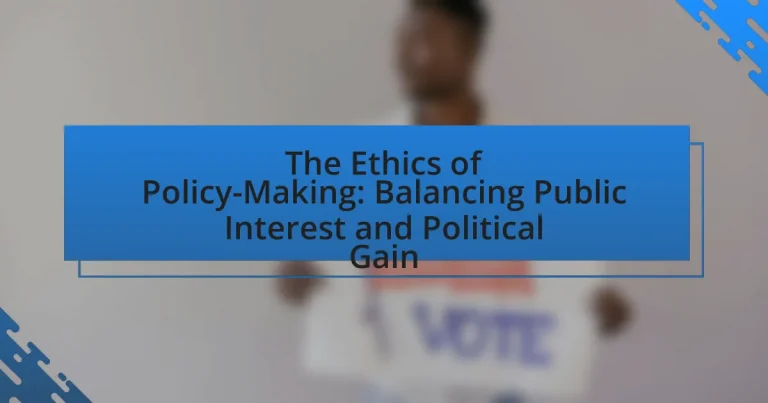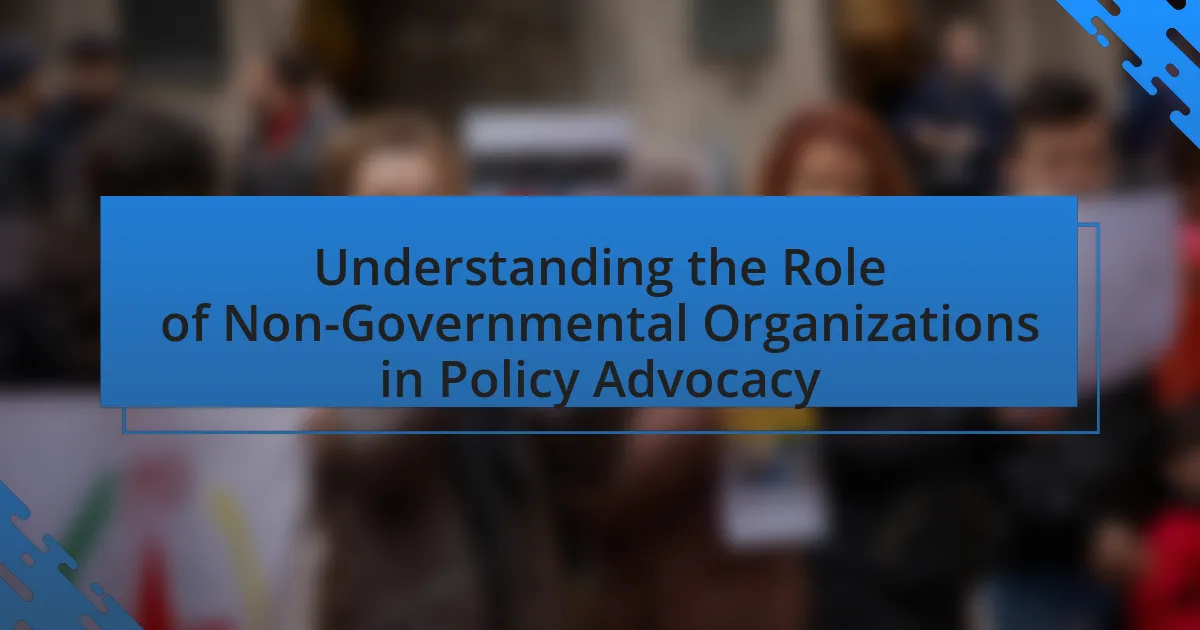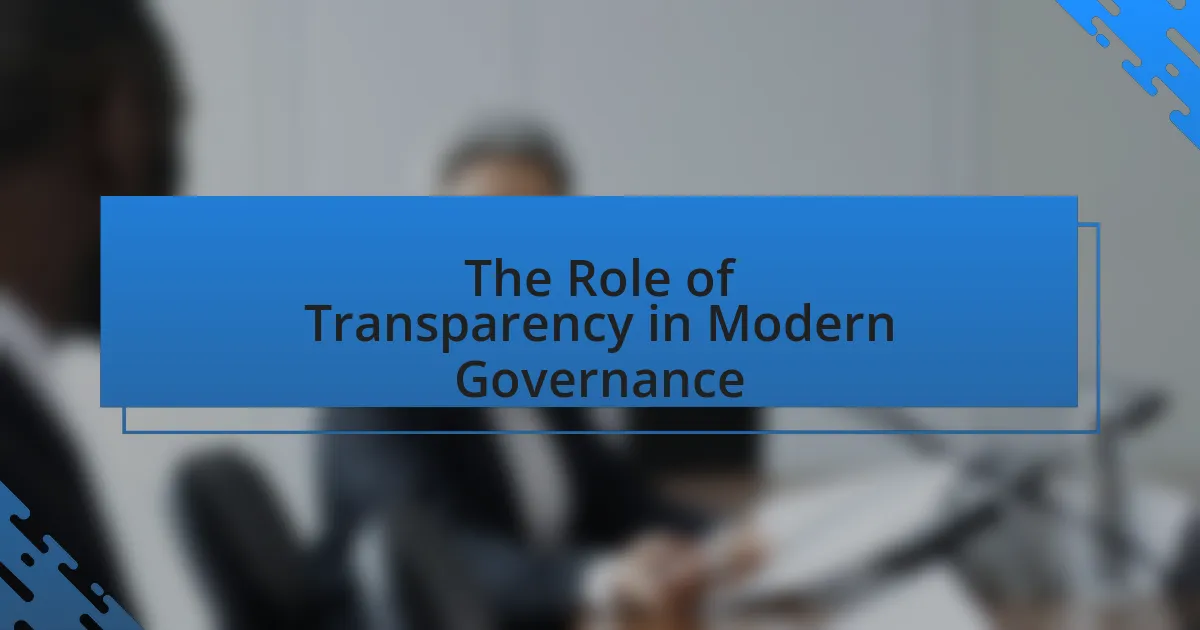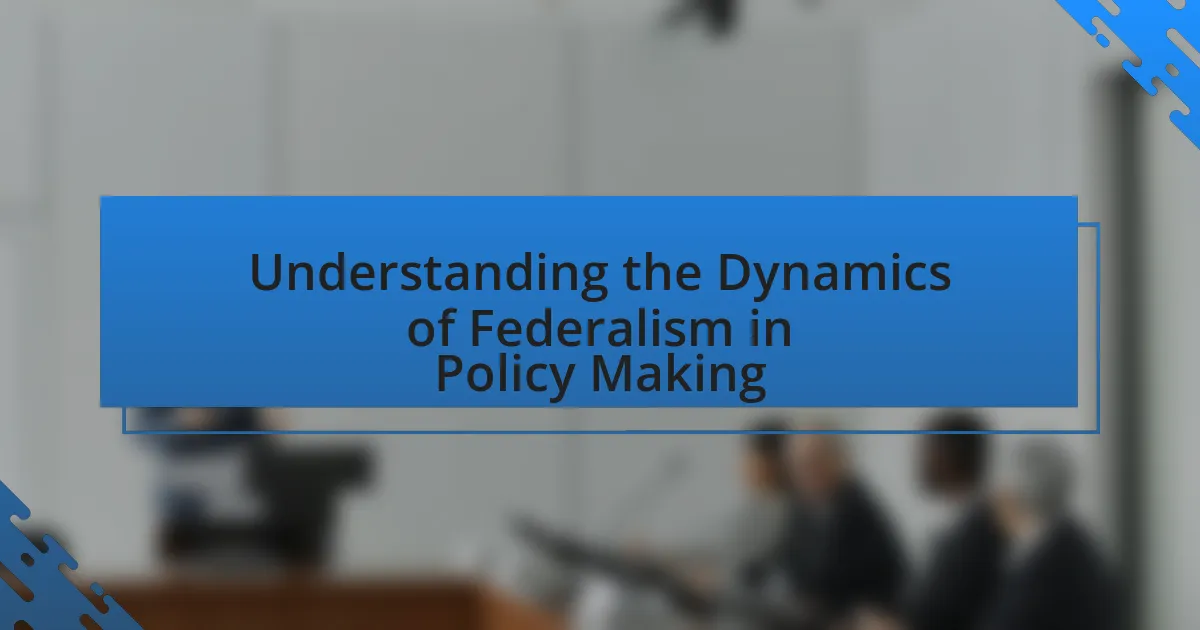The article examines the ethics of policy-making, focusing on the balance between public interest and political gain. It outlines key ethical considerations such as transparency, accountability, equity, and the public good, emphasizing their importance in fostering trust in governance. The article also explores the intersection of public interest and political objectives, potential conflicts that arise, and strategies for prioritizing ethical standards in policy decisions. Additionally, it discusses the roles of various stakeholders, the impact of interest groups, and best practices for ensuring ethical governance in policy-making processes.
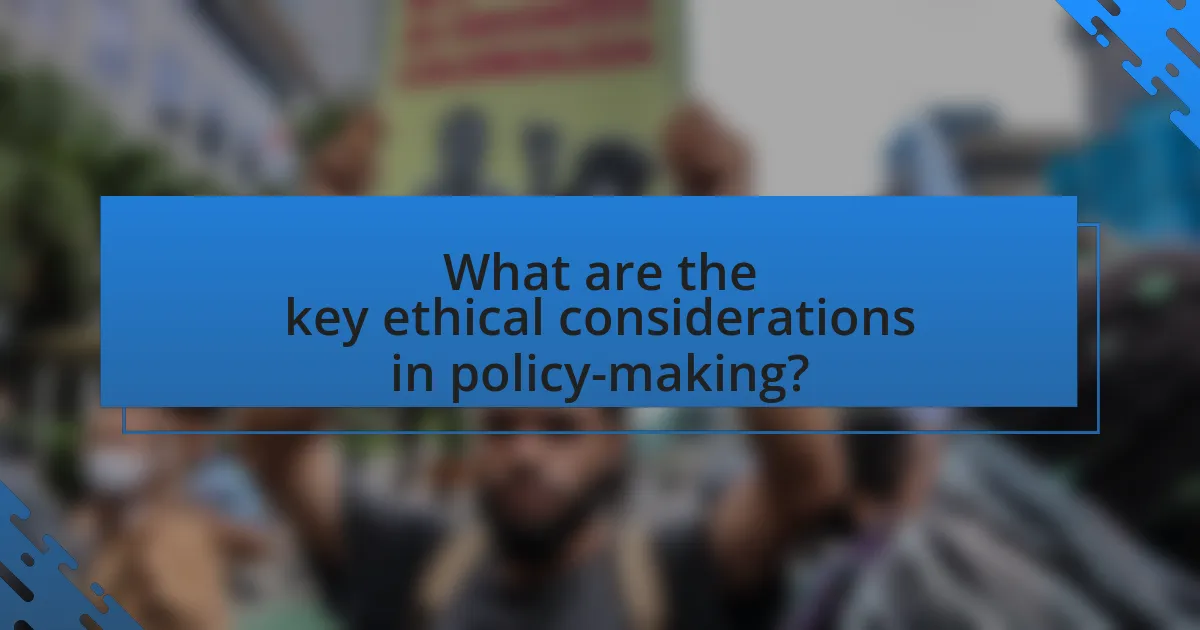
What are the key ethical considerations in policy-making?
Key ethical considerations in policy-making include transparency, accountability, equity, and the public good. Transparency ensures that decision-making processes are open and accessible, allowing stakeholders to understand how policies are formulated. Accountability holds policymakers responsible for their actions and decisions, fostering trust in governance. Equity addresses the fair distribution of resources and benefits, ensuring that all groups, especially marginalized communities, are considered in policy outcomes. The public good emphasizes prioritizing the welfare of the community over individual or political interests. These considerations are essential for fostering ethical governance and maintaining public trust in policy decisions.
How do public interest and political gain intersect in policy decisions?
Public interest and political gain intersect in policy decisions through the prioritization of policies that serve both the electorate’s needs and the political objectives of decision-makers. Policymakers often craft legislation that addresses pressing societal issues, such as healthcare or education, while simultaneously enhancing their political capital or electoral prospects. For instance, the Affordable Care Act, enacted in 2010, aimed to expand healthcare access, reflecting public interest, while also serving as a significant political achievement for the Democratic Party, bolstering their standing in subsequent elections. This dual focus can lead to policies that, while beneficial to the public, are also strategically advantageous for politicians, illustrating the complex relationship between ethical governance and political strategy.
What are the potential conflicts between public interest and political gain?
Potential conflicts between public interest and political gain arise when policymakers prioritize their own electoral success over the welfare of the community. For instance, politicians may enact policies that are popular among voters but detrimental to long-term societal needs, such as tax cuts that reduce funding for essential public services. This misalignment can lead to short-term benefits for politicians, such as increased voter support, while undermining critical infrastructure, education, and healthcare systems that serve the public interest. Historical examples include the 2008 financial crisis, where regulatory rollbacks favored financial institutions at the expense of consumer protection, illustrating how political motivations can conflict with the broader public good.
How can policy-makers prioritize public interest over political gain?
Policy-makers can prioritize public interest over political gain by implementing transparent decision-making processes and engaging in active public consultation. Transparency ensures that policy decisions are made openly, allowing citizens to understand the rationale behind them, which can reduce the influence of political motivations. For instance, studies show that when governments involve citizens in the policy-making process, such as through public forums or surveys, the resulting policies are more likely to reflect the needs and desires of the community rather than the interests of political elites. Additionally, establishing accountability mechanisms, such as independent oversight bodies, can further ensure that policy-makers remain focused on serving the public rather than pursuing personal or party interests.
Why is transparency important in the policy-making process?
Transparency is crucial in the policy-making process because it fosters accountability and trust between the government and the public. When policymakers operate transparently, stakeholders can access information regarding decisions, enabling them to understand the rationale behind policies. This openness reduces the likelihood of corruption and promotes informed public participation, as evidenced by studies showing that transparent governance leads to higher citizen engagement and satisfaction with government actions. For instance, the World Bank has reported that countries with transparent policy processes experience improved governance outcomes and reduced instances of bribery.
What role does transparency play in building public trust?
Transparency is crucial in building public trust as it fosters accountability and openness in decision-making processes. When governments and organizations provide clear information about their actions, policies, and intentions, they reduce uncertainty and suspicion among the public. Research indicates that transparency can lead to increased citizen engagement and satisfaction; for instance, a study by the World Bank found that transparent governance practices correlate with higher levels of public trust and compliance with regulations. This relationship underscores the importance of transparency in enhancing the legitimacy of institutions and their policies, ultimately contributing to a more informed and trusting public.
How can transparency mitigate unethical practices in policy-making?
Transparency can mitigate unethical practices in policy-making by fostering accountability and enabling public scrutiny. When policy processes are open and accessible, stakeholders, including citizens and watchdog organizations, can monitor decision-making, reducing opportunities for corruption and favoritism. For instance, studies have shown that countries with higher levels of transparency, such as Sweden and New Zealand, experience lower levels of corruption, as public officials are less likely to engage in unethical behavior when they know their actions are subject to public examination. This correlation between transparency and ethical governance underscores the importance of open information in promoting integrity within policy-making.
What frameworks exist to guide ethical policy-making?
Several frameworks exist to guide ethical policy-making, including the Utilitarian Approach, the Rights Approach, the Justice Approach, and the Common Good Approach. The Utilitarian Approach focuses on maximizing overall happiness and minimizing harm, while the Rights Approach emphasizes the protection of individual rights and freedoms. The Justice Approach advocates for fairness and equity in policy decisions, ensuring that benefits and burdens are distributed justly. Lastly, the Common Good Approach prioritizes the welfare of the community as a whole, promoting policies that benefit society at large. These frameworks provide structured methodologies for evaluating ethical dilemmas in policy-making, ensuring that decisions align with moral principles and societal values.
What are the principles of ethical policy-making frameworks?
The principles of ethical policy-making frameworks include transparency, accountability, inclusiveness, fairness, and evidence-based decision-making. Transparency ensures that the policy-making process is open and accessible, allowing stakeholders to understand how decisions are made. Accountability holds policymakers responsible for their actions and decisions, fostering trust in the system. Inclusiveness involves engaging diverse stakeholders in the policy process, ensuring that various perspectives are considered. Fairness emphasizes equity and justice in policy outcomes, while evidence-based decision-making relies on data and research to inform policies, enhancing their effectiveness and legitimacy. These principles are essential for promoting ethical governance and ensuring that policies serve the public interest rather than political gain.
How do these frameworks address the balance between public interest and political gain?
These frameworks address the balance between public interest and political gain by establishing guidelines that prioritize ethical decision-making and accountability in policy formulation. For instance, frameworks such as the Public Interest Disclosure Act promote transparency, requiring policymakers to disclose potential conflicts of interest, thereby reducing the likelihood of decisions being swayed by political motivations. Additionally, the principles of participatory governance encourage stakeholder engagement, ensuring that public needs are considered in the decision-making process, which can mitigate the influence of political agendas. Evidence from studies, such as the one conducted by the OECD, indicates that transparent governance leads to higher public trust and better policy outcomes, reinforcing the importance of these frameworks in aligning political actions with the public good.
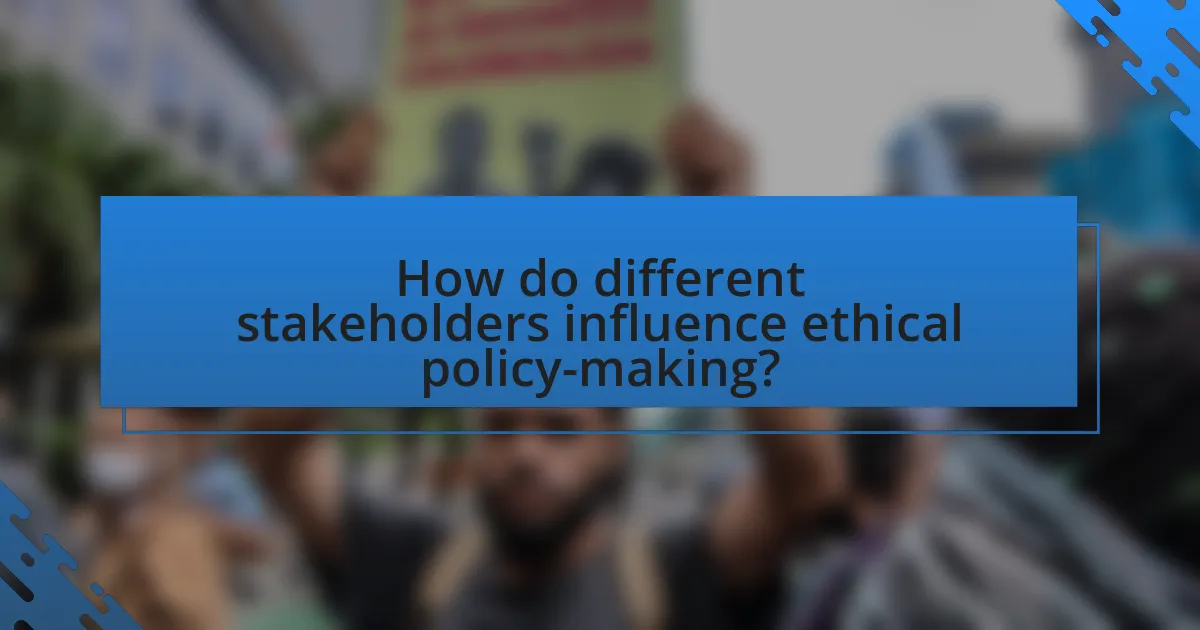
How do different stakeholders influence ethical policy-making?
Different stakeholders influence ethical policy-making by shaping the agenda, providing resources, and advocating for specific interests. For instance, government officials prioritize public welfare while balancing political pressures, which can lead to ethical dilemmas. Business leaders often lobby for regulations that favor their industries, impacting policy outcomes. Non-governmental organizations (NGOs) advocate for social justice and environmental protection, influencing public opinion and policy decisions. Academic institutions contribute research and expertise, guiding evidence-based policy-making. These interactions create a complex landscape where ethical considerations must be weighed against competing interests, as seen in cases like the 2008 financial crisis, where stakeholder actions significantly affected regulatory responses.
Who are the primary stakeholders in the policy-making process?
The primary stakeholders in the policy-making process include government officials, interest groups, the public, and non-governmental organizations (NGOs). Government officials, such as legislators and bureaucrats, are responsible for drafting and implementing policies. Interest groups, including businesses and advocacy organizations, seek to influence policy outcomes to benefit their specific interests. The public plays a crucial role by expressing opinions and voting, which can shape policy directions. NGOs often advocate for social issues and provide expertise, influencing policy through research and public campaigns. These stakeholders interact dynamically, impacting the ethical considerations of balancing public interest with political gain.
What roles do government officials, lobbyists, and the public play?
Government officials, lobbyists, and the public each play distinct roles in the policy-making process. Government officials are responsible for creating and implementing laws and regulations that reflect the interests of their constituents while balancing political pressures. Lobbyists advocate for specific interests, providing information and resources to influence policy decisions in favor of their clients, often representing corporations or special interest groups. The public plays a crucial role by voicing opinions, voting, and engaging in civic activities, which can shape the priorities and actions of government officials. This dynamic interaction among these groups is essential for ensuring that policy-making considers both public interest and political gain.
How can stakeholder engagement enhance ethical policy outcomes?
Stakeholder engagement enhances ethical policy outcomes by incorporating diverse perspectives and values into the decision-making process. This inclusivity leads to policies that are more reflective of the community’s needs and ethical standards. For instance, research by the International Association for Public Participation indicates that when stakeholders are actively involved, the resulting policies are more likely to gain public trust and support, which is crucial for effective implementation. Furthermore, engaging stakeholders can identify potential ethical dilemmas early, allowing policymakers to address them proactively, thereby fostering transparency and accountability in governance.
What impact do interest groups have on policy ethics?
Interest groups significantly influence policy ethics by shaping the priorities and values that guide decision-making processes. These organizations often advocate for specific interests, which can lead to ethical dilemmas when their goals conflict with the broader public interest. For instance, research by the Center for Responsive Politics indicates that lobbying expenditures in the United States reached approximately $3.5 billion in 2020, highlighting the substantial resources interest groups allocate to sway policy outcomes. This financial power can create situations where the interests of a few outweigh the needs of the many, raising ethical concerns about representation and accountability in policy-making.
How do interest groups advocate for their agendas in policy-making?
Interest groups advocate for their agendas in policy-making primarily through lobbying, grassroots mobilization, and providing research and expertise to policymakers. Lobbying involves direct interaction with legislators and government officials to influence decisions, often supported by data and case studies that align with the group’s objectives. For instance, the American Medical Association employs lobbyists to advocate for healthcare policies that benefit its members, demonstrating the effectiveness of targeted lobbying efforts. Grassroots mobilization engages the public to raise awareness and pressure policymakers, exemplified by campaigns like the Sierra Club’s initiatives to promote environmental legislation. Additionally, interest groups often produce reports and studies that highlight specific issues, thereby shaping the policy discourse and providing evidence-based recommendations to lawmakers. This multifaceted approach enables interest groups to effectively push their agendas within the complex landscape of policy-making.
What are the ethical implications of interest group influence?
Interest group influence raises significant ethical implications, primarily concerning the potential for unequal representation and the prioritization of specific interests over the public good. When interest groups, often funded by wealthy donors or corporations, exert influence on policymakers, they can skew legislative outcomes in favor of their agendas, undermining democratic principles. For instance, research by the Center for Responsive Politics indicates that in the 2020 election cycle, over $14 billion was spent on lobbying, highlighting the disproportionate power that well-funded groups hold in shaping policy. This financial leverage can lead to policies that favor a minority at the expense of the broader population, raising questions about fairness and equity in governance. Additionally, the lack of transparency in lobbying activities can erode public trust in government institutions, as citizens may perceive that decisions are made behind closed doors rather than in the interest of the common good.
How can public participation improve ethical standards in policy-making?
Public participation can improve ethical standards in policy-making by fostering transparency and accountability. When citizens engage in the policy-making process, they provide diverse perspectives that can highlight ethical considerations and potential conflicts of interest. For instance, studies have shown that inclusive decision-making leads to policies that better reflect the values and needs of the community, thereby enhancing legitimacy and trust in governmental actions. Research by the National Democratic Institute indicates that public involvement in policy discussions can reduce corruption and increase adherence to ethical norms, as stakeholders are more likely to hold policymakers accountable for their decisions.
What methods can be used to encourage public involvement?
To encourage public involvement, methods such as public consultations, participatory budgeting, and community engagement initiatives can be employed. Public consultations allow citizens to voice their opinions and contribute to decision-making processes, fostering a sense of ownership and responsibility. Participatory budgeting enables community members to directly influence how public funds are allocated, enhancing transparency and accountability. Community engagement initiatives, such as workshops and forums, facilitate dialogue between policymakers and the public, ensuring diverse perspectives are considered. Research indicates that these methods lead to increased civic participation and trust in government, as evidenced by studies showing that communities with active public involvement report higher satisfaction with local governance.
How does public feedback shape ethical policy decisions?
Public feedback significantly shapes ethical policy decisions by providing insights into the values and concerns of the community. Policymakers utilize this feedback to align their decisions with public expectations, ensuring that policies reflect societal norms and ethical standards. For instance, studies have shown that public consultations can lead to more equitable outcomes, as seen in the implementation of participatory budgeting in cities like Porto Alegre, Brazil, where citizen input directly influenced budget allocations, resulting in improved social services. This demonstrates that incorporating public feedback not only enhances transparency but also fosters trust in governmental processes, ultimately leading to more ethical and effective policy outcomes.
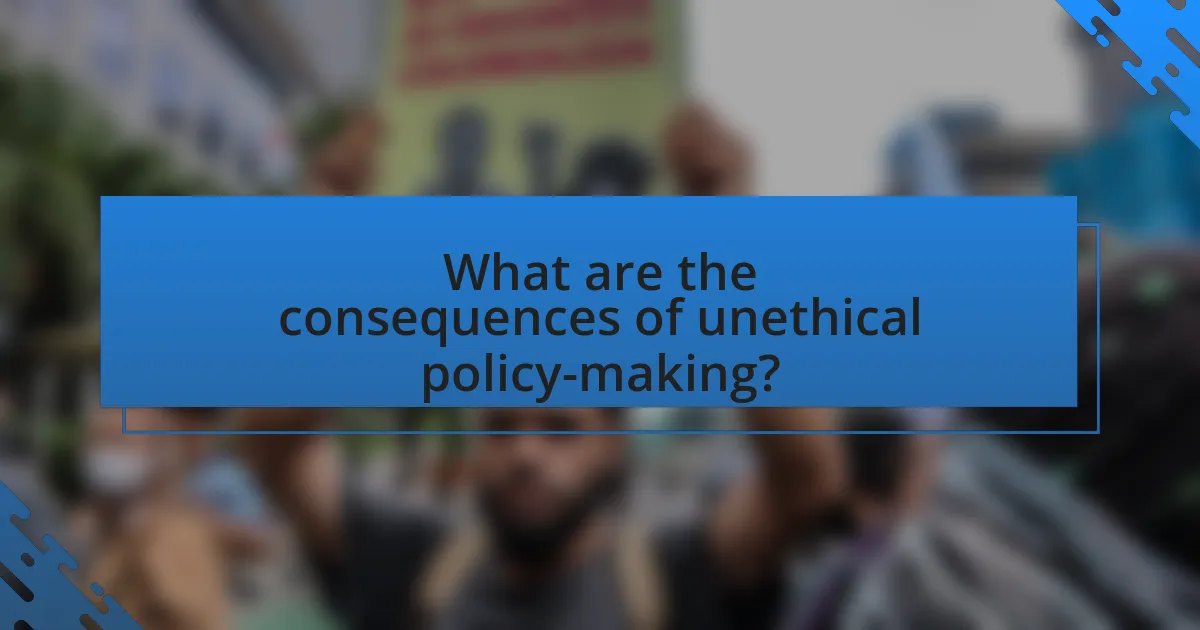
What are the consequences of unethical policy-making?
Unethical policy-making leads to significant negative consequences, including erosion of public trust, increased corruption, and social inequality. When policies are crafted without ethical considerations, they often prioritize the interests of a select few over the broader public good, resulting in policies that may favor powerful lobbyists or special interest groups. For instance, a study by the World Bank found that corruption in policy-making can lead to a 1% decrease in economic growth, demonstrating the tangible impact of unethical practices. Additionally, unethical policies can exacerbate social disparities, as marginalized communities may be disproportionately affected by decisions that lack fairness and transparency. This cycle of mistrust and inequality can destabilize societies and hinder effective governance.
What are the short-term effects of unethical practices in policy-making?
Unethical practices in policy-making lead to immediate erosion of public trust and increased cynicism towards government institutions. When policymakers engage in corruption or favoritism, citizens perceive the system as unjust, resulting in decreased civic engagement and participation. For instance, a study by the Pew Research Center found that 70% of Americans believe that government corruption is a significant problem, which directly correlates with lower voter turnout and public apathy. Additionally, unethical practices can result in hasty and poorly constructed policies that prioritize personal or political gain over the public good, leading to negative social and economic consequences in the short term.
How can unethical policy decisions lead to public disillusionment?
Unethical policy decisions can lead to public disillusionment by eroding trust in government and institutions. When policymakers prioritize personal or political gain over the public good, citizens perceive these actions as betrayals of their interests. For instance, the 2008 financial crisis, exacerbated by unethical practices in the banking sector and insufficient regulatory oversight, resulted in widespread public anger and a loss of faith in financial institutions and government regulators. This disillusionment manifests as decreased civic engagement, increased skepticism towards future policies, and a general sense of alienation from the political process.
What are the implications for governance and accountability?
The implications for governance and accountability in the context of policy-making ethics involve the necessity for transparency, stakeholder engagement, and adherence to ethical standards. Effective governance requires that policymakers prioritize the public interest over political gain, ensuring that decisions are made based on evidence and community needs. For instance, the 2018 Global Integrity Report highlights that countries with robust accountability mechanisms, such as independent audits and public reporting, experience lower levels of corruption and higher public trust. This demonstrates that accountability frameworks directly influence governance quality, fostering an environment where ethical policy-making can thrive.
What long-term impacts can arise from a lack of ethical standards?
A lack of ethical standards can lead to widespread corruption and erosion of public trust in institutions. When ethical guidelines are absent, decision-makers may prioritize personal or political gain over the public interest, resulting in policies that favor specific groups rather than the broader community. This can create a cycle of distrust, where citizens become disengaged from the political process, leading to lower civic participation and increased apathy towards governance. Historical examples, such as the Watergate scandal, illustrate how unethical behavior in politics can have long-lasting effects on public perception and institutional integrity, ultimately undermining democracy itself.
How does unethical policy-making affect societal trust in government?
Unethical policy-making significantly erodes societal trust in government. When policies are perceived as unjust or self-serving, citizens become skeptical of the government’s intentions and integrity. For instance, a study by the Pew Research Center in 2021 found that 70% of Americans believe that government corruption is a major problem, which directly correlates with declining trust in public institutions. This skepticism can lead to decreased civic engagement, lower voter turnout, and a general disillusionment with democratic processes, further undermining the effectiveness of governance.
What are the potential risks to democracy and civic engagement?
The potential risks to democracy and civic engagement include the erosion of trust in institutions, the spread of misinformation, and the marginalization of certain groups. Erosion of trust occurs when citizens perceive government actions as corrupt or self-serving, leading to disengagement from the political process; for instance, a 2021 Pew Research study found that only 24% of Americans expressed trust in the federal government. Misinformation undermines informed decision-making, as seen during the 2020 U.S. elections, where false narratives significantly influenced public opinion and voter behavior. Additionally, the marginalization of groups, particularly minorities, can result in unequal representation and participation, as highlighted by the Voting Rights Act of 1965, which aimed to address systemic disenfranchisement. These factors collectively threaten the foundational principles of democracy and civic engagement.
What best practices can ensure ethical policy-making?
Best practices that can ensure ethical policy-making include transparency, stakeholder engagement, and accountability. Transparency involves making information accessible to the public, which fosters trust and allows for informed public discourse. Stakeholder engagement ensures that diverse perspectives are considered, leading to more equitable outcomes. Accountability mechanisms, such as regular audits and evaluations, hold policymakers responsible for their decisions and actions. Research indicates that jurisdictions with high levels of transparency and stakeholder participation report better policy outcomes and increased public trust in government, as evidenced by studies from the World Bank and the OECD.
How can policy-makers implement ethical guidelines effectively?
Policy-makers can implement ethical guidelines effectively by establishing clear frameworks that prioritize transparency, accountability, and stakeholder engagement. These frameworks should include specific procedures for ethical decision-making, regular training for officials on ethical standards, and mechanisms for public input to ensure that diverse perspectives are considered. Research indicates that jurisdictions with robust ethical guidelines, such as the United States Office of Government Ethics, demonstrate improved public trust and reduced instances of corruption, highlighting the importance of structured ethical frameworks in policy-making.
What role does continuous education play in promoting ethical standards?
Continuous education plays a crucial role in promoting ethical standards by ensuring that individuals remain informed about evolving ethical norms and practices. This ongoing learning process equips professionals with the knowledge necessary to navigate complex ethical dilemmas, particularly in fields like policy-making where public interest and political gain often intersect. Research indicates that organizations that prioritize continuous education in ethics report higher compliance with ethical standards and a stronger organizational culture. For instance, a study by the Ethics & Compliance Initiative found that companies with robust ethics training programs experience 50% fewer incidents of misconduct compared to those without such programs. This evidence underscores the importance of continuous education in fostering an environment where ethical standards are upheld and reinforced.
